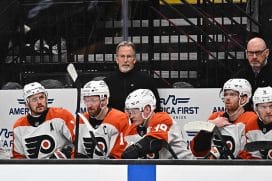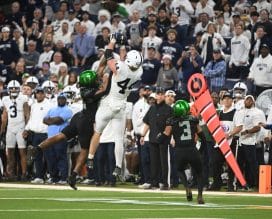Uncategorized
Should the World Cup of Hockey Replace the Olympics?
By Dan Heaning, Sports Talk Philly staff writer
Hockey fans got an early Christmas gift this year with the return of the international tournament, the World Cup of Hockey.
For the past two weeks, the World Cup has been in exhibition mode and games have been largely relegated to ESPN3.
All that ends on Saturday as Round Robin play begins with Team USA squaring off against Team Europe at 3:30 p.m. followed by Team Canada taking on Team Czech Republic at 8 p.m.
Seeing the return of the World Cup is great. After all, it was in the 1996 World Cup that the USA Hockey claimed one of it’s greatest victories and the last time the US won any international hockey tournament, excluding its three World Junior titles in 2004, 2010 and 2013.
In the 1996 World Cup, Flyers great John LeClair along with then-Flyer Joel Otto and future Flyer Tony Amonte helped the United States defeat Canada in three games to win the title. Philadelphia native Mike Richter played a significant role in the US gold medal and earned the tournament’s MVP honor. LeClair scored six goals and finished second only to teammate Brett Hull in points with 10. Amonte scored the game-winning goal in the winner-take-all Game 3 against Canada.
In those 20 years between the US victory and this year’s World Cup, only one tournament was held in 2004. Hockey fans remember that tournament being the last bit of NHL sanctioned play before the 2004-05 season was canceled due to the lockout.
Over the course of those 20 years, the NHL spread out to the Olympics. That gave the league and players little excuse to want to set up another World Cup.
But it appears that trend may end, as players' insurance and travel cost concerns have made the likelihood of NHL players participating in the 2018 Winter Olympics in Pyeongchang, South Korea slim.
This could mean that the World Cup may become a mainstay and the international tournament that houses NHL talent from here on out.
If that is the case, the NHL needs to rework some things about the tournament for the future.
First thing, this is the first World Cup/Canada Cup tournament that will extend into October and the only one that started in mid-September. All the other tournaments started in late August or early September.
Seeing hockey in August is great. Hockey fans get to see the sport they love one month early and something interesting happens in the hockey world in the "dog days" of the offseason.
From the Stanley Cup Finals and Draft in June to free agency in July to potentially playing games in August, such a schedule keeps the NHL relevant throughout the entire year.
Second, as fun as it is to see the 23 and under Team North America — and they are a fast, exciting squad to watch — if the NHL wants the World Cup to be the equivalent, or even in the same discussion, as the Olympics then North America and Team Europe’s slots have to go to actual countries, not these continental All-Star teams.
It does make sense for the NHL to set up those teams, no question. It highlights the league’s top young players and gives more chances for NHL caliber European players to play in the tournament. International incumbents like Slovakia and Switzerland would have some trouble icing squads made entirely of NHL players.
However, it’s hard to give this World Cup tournament as much nationalistic pride when there’s a Team USA and a Team North America that also contains young American players.
What happens if Team North America wins the whole thing? Who celebrates that as a whole? Not Canada. Not the United States. Flyers fans, maybe, due to Shayne Gostisbehere and Sean Couturier.
But other than fans of individual players, would a Team North America victory increase American interest in the sport like when Team USA won the 1996 World Cup? Doubtful.
By the way, this is all moot if the NHL continues to send its players to the Olympics, which it should do anyway. If that continues to happen, while it is looking doubtful at this point, the North American and European teams actually help to differentiate the tournaments. But they do little to add to the prestige.
The World Cup of Hockey is great and all, but nothing compares to the stage of the Olympics, even if staging them is highly cumbersome to the hosting city and violates numerous human rights.
There’s a reason someone like Steven Stamkos accelerated his right leg rehab to attempt to play in the 2014 Olympics while players are dropping out of the World Cup like it’s a music appreciation class.
There’s a reason someone like Jeremy Roenick ditched the 1996 World Cup because of a contract dispute but played in the 1998 and 2002 Winter Olympics.
There’s a reason why one of NBCSN’s most highly rated events was a Friday afternoon Olympic game between the United States and Canada.
The Olympics gets the attention of both players and fans.
The World Cup can’t match that. It’ll likely never be able to match that. Not unless another 1996 World Cup victory happens for the US, but with fanbases divided to Team North America, a comparable impact would be stunted.





